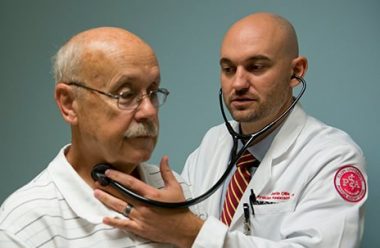The master’s program in Elon’s School of Health Sciences has successfully completed a rigorous review process by ARC-PA, the accrediting agency for PA programs.
Elon University’s Physician Assistant Studies Program has achieved a major milestone with recognition by the national accrediting body that reviews PA programs.

“The Accreditation Review Commission on Education for the Physician Assistant (ARC-PA) has granted Accreditation-Continued status to the Elon University Physician Assistant Program sponsored by Elon University. Accreditation-Continued is an accreditation status granted when a currently accredited program is in compliance with the ARC-PA Standards.
“Accreditation remains in effect until the program closes or withdraws from the accreditation process or until accreditation is withdrawn for failure to comply with the Standards. The approximate date for the next validation review of the program by the ARC-PA will be September 2026. The review date is contingent upon continued compliance with the Accreditation Standards and ARC-PA policy.”
Elon’s PA program had previously been provisionally accredited by ARC-PA. Accreditation-Continued status is granted when a currently accredited program meets the rigorous ARC-PA standards. The continued accreditation status remains valid for the next 10 years, as long as the program remains compliant with Accreditation Standards and ARC-PA policy.
The new accreditation comes less than four years after the first class of students enrolled in Elon’s program.
“Achieving this milestone and high standard of quality is a wonderful affirmation of the extraordinary work of the faculty, staff and students in Elon’s Physician Assistant Studies Program,” said Elon University Provost Steven House. “We are all exceedingly proud of Department Chair and Program Director Patti Ragan and her entire team who helped the program reach this important stage in its development. We look forward to their continued success as they realize the departmental vision of ‘Learning. Caring. Serving. Leading.’”
Planning for a physician assistant studies program got underway at Elon in 2008, with the first director and faculty hired in 2011. The first class of 37 physician assistant students arrived in January 2013 and graduated in spring 2015. Elon graduates have a cumulative 97 percent first-time pass rate for the Physician Assistant National Certification Exam that is required to practice medicine as a physician assistant. That’s three percentage points higher than the five-year national average first-time pass rate of 94 percent, as reported by the National Commission on Certification of Physician Assistants.
“One of the most exciting things for a new program is to reach the significant milestones along the way: provisional accreditation, first class and first graduates,” said Professor Patti Ragan, department chair and director of the Physician Assistant Studies Program. “All of our program faculty, staff and medical directors, along with our students and graduates, are very appreciative of the incredible support that our institutional leadership, clinical health affiliates and clinical preceptor community have provided to make this possible. We look forward to continuing to educate well-prepared graduates who value patient-centered care and give back to their communities.”
Demand for the medical care delivered by physician assistants continues to increase within the broader health care system. Health care is evolving, with the delivery of care now based on much more of a team approach that employs a variety of medical professionals with different levels of expertise and training. That evolution depends upon an ample supply of more mid-level providers, such as the physician assistants who complete their training at Elon.
Elon’s program is one of 210 physician assistant programs in the United States accredited by ARC-PA. Within North Carolina, Elon’s program is one of only seven with accreditation – continued status. Elon’s program has enrolled four classes to-date, with the fifth to arrive in January. The program has averaged 1,300 applications each year for just 38 seats in each incoming class.
Elon’s 27-month, full-time program prepares graduates to think critically and act skillfully to meet expanding health care needs in local and global communities. Students immerse themselves in a curriculum structured around active learning strategies through collaborative work with Elon’s faculty, scholars and practitioners in the field. Their time in the program includes a didactic phase that focuses on learning in the classroom and a clinical phase that has students working with preceptors in clinical settings such as hospitals, clinical and physician offices.
A survey last September found 100 percent of the program’s Class of 2015 working as physician assistants, with about half working in North Carolina and a quarter working in primary care.
The ARC-PA is an independent accrediting agency that defines the standards for PA education and evaluates PA educational programs within the territorial United States to ensure their compliance with those standards. The accreditation process is designed to encourage sound educational practices and innovation by programs and to stimulate continuous self-study and improvement.
The American Academy of Family Physicians, the American Academy of Pediatrics, the American Academy of Physician Assistants, the American College of Physicians, the American College of Surgeons, the American Medical Association, and the Physician Assistant Education Association all cooperate with the ARC-PA as collaborating organizations to establish, maintain, and promote appropriate standards of quality for entry level education of physician assistants and to provide recognition for educational programs that meet the minimum requirements outlined in these standards.


